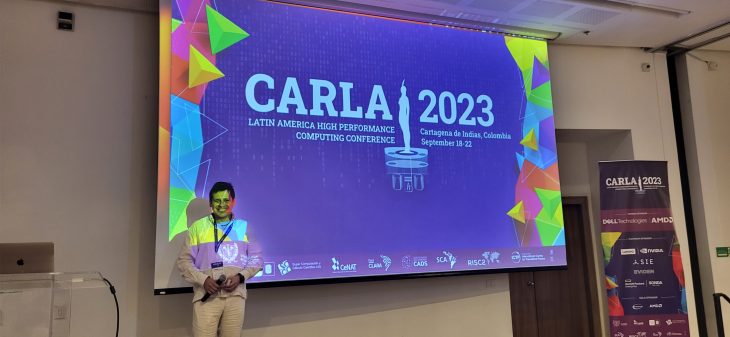
From September 18 to 22, Cartagena de Indias, Colombia, hosted the Latin America High-Performance Computing Conference (CARLA), which brought together around 300 researchers in the field from around the world — with particular emphasis on the presence of young and female researchers . With a varied program, the event aimed to provide a discussion forum to encourage the growth and strengthening of the High-Performance Computing community in Latin America, focusing on the exchange and dissemination of ideas, techniques, and research, as well as their application.
Given the nature of the project, RISC2 could not fail to be represented through its partners and with a strong presence in the event’s program. Carlos J. Barrios, researcher from the Universidad Industrial de Santander and RISC2 partner was responsible for opening CARLA, with his address setting the tone for the conference, emphasizing the importance of collaborative efforts and knowledge sharing in furthering the frontiers of HPC.
Fabrizio Gagliardi, the coordinator of RISC2, also took center stage with a special talk that introduced the audience to the mission and objectives of the RISC2 project. The presentation shed light on the pivotal role that RISC2 plays in advancing HPC research and development of the cooperation between the two continents in this field. Gagliardi participated in the EuroHPCLatam panel: Policy and Global Actions, which included representatives from Red Clara, CAF and the Ministry of CyT Colombia. This panel explored the policies and global actions required to propel HPC forward in Latin America, emphasizing collaboration between key stakeholders.
Another highlight of CARLA 2023 was the tribute to Mateo Valero, one of the promoters of RISC2. Valero’s dedication and contributions to the field were celebrated through an award with his name and one he was the first recepient, underscoring the lasting impact of his work on the entire HPC community.
This event was particularly important as it coincided with the end of the RISC2 project and the presentation of its results. Over the course of three years, the initiative has strengthened contacts and promoted the exchange of knowledge between researchers from Latin America and Europe through the organization of nine webinars, the support of several schools, workshops, and other training events in the field for young students and researchers. During this period, RISC2 partners also participated in several conferences and ceremonies with policymakers to raise awareness of the importance of continuing to support and prioritize this area of research in the future.